From the moment Tony Stark put on power armor to slug it out with Obadiah Stane for control of Arc Reactor technology, the Marvel Cinematic Universe has been about a generational struggle against Bad Dads for the fate of the world.
Each movie is the story of men (mostly) realizing that they can no longer rely on their fathers (or uncles, or other surrogate father figures) to fix their problems for them, and now must use their own sense of morality and ethics to decide what to do with the great power they possess.
This theme of growing up and becoming an adult comes directly from the Marvel comics of the ‘60s, where many of the characters and most of the target audience were teenagers. It’s a little weird in the films, considering the three main Marvel men are 53, 100, and 1500 years old. However, Tony Stark, Steve Rogers, and Thor are all in states of arrested development in the early MCU films—Tony and Thor because their Bad Dads are keeping important responsibilities from them, Steve in a literal block of ice—and their film series have been about them learning and relearning that what they were taught as kids is not how the world actually works.
There are three types of Bad Dad, three ways that Marvel fathers fail their children.
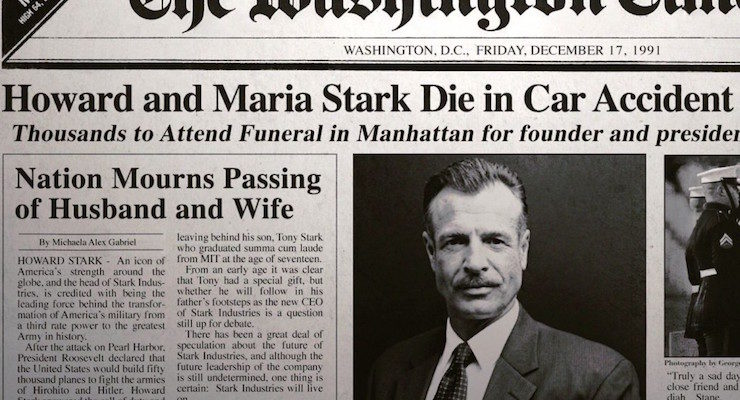
The first is the Dead Dad. Not bad in a moral sense, but merely in a practical one—we can all agree that corpses are not good at child rearing. The Dead Dad can’t step in and tell the hero what to do because, well, they died—usually in a violent manner, usually in the hero’s arms, usually after imparting an important lesson about power and its relationship to responsibilities. The Dead Dad needs to be replaced, and honored at the same time.
The Dead Dad that looms over the entire MCU is Howard Stark. So much of the Iron Man movies, and then the Avengers and the Captain America movies, is Tony Stark trying to fill the hole—in his company, in S.H.I.E.L.D., in the world—left by his father’s death. Tony’s every move is checked against whether his father would have done the same thing, and he’ll never know, because his dad is dead. It’s not a coincidence that even as a successful adult, Tony has the emotional capacity of the brilliant and angry teenager he was the night his parents were killed.
Other examples of the Dead Dad are Dr. Yinsen, Dr. Erskine, Phil Coulson, and T’Chaka. Spider-Man has the most famous Dead Dad in Marvel Comics, maybe the second most famous in all superhero-dom. So famous, in fact, that, in a baller move, the three MCU films featuring Spider-Man have never mentioned his name, his death only obliquely referred to as “everything my aunt’s been through.” The filmmakers trust that you know.
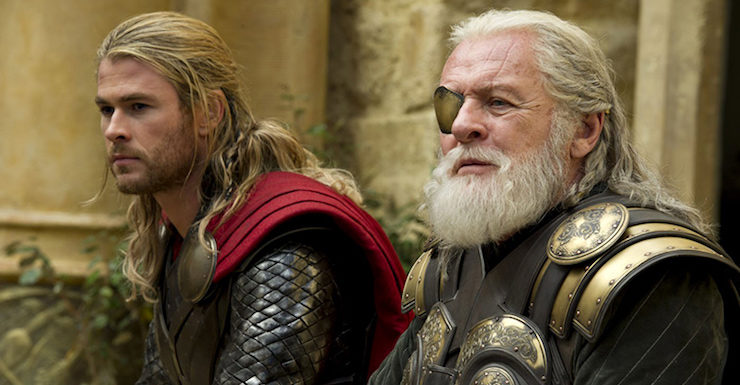
Worse than the Dead Dads are the Crap Dads. A Crap Dad wants what’s best for his children, but also wants to control them, either through abuse of authority or through outright lies and sins of omission. Crap Dads are complicated, scared and proud, hiding their mistakes and leaving their kids unprepared for real hardships to come. And while they are not villains themselves, they often end up empowering the villains through their misguided attempts at saving their own reputation. The Crap Dad is meant to be outgrown.
The ultimate Crap Dad is Odin. The plot of every Thor film is that Odin neglected to tell Thor about some threat from the past (Loki/Elves/Hela), now it’s back and Thor has to clean it up himself because Odin is too busy sleeping/mourning/being dead. And despite the fact that Thor keeps learning his dad was a really shitty dude, Thor still strives for his approval, even after Odin dies. (This being a fantasy, that’s not entirely a futile gesture.)
Not that Odin’s alone. By far, Crap Dad is the most common type of Dad in the MCU. There’s General Ross, Nick Fury, Yondu, Hank Pym, the Ancient One, and (once again) T’Chaka. Again, part of the coming of age story is learning your heroes have feet of clay, and that becoming your own person leads to a complicated relationship with your father.
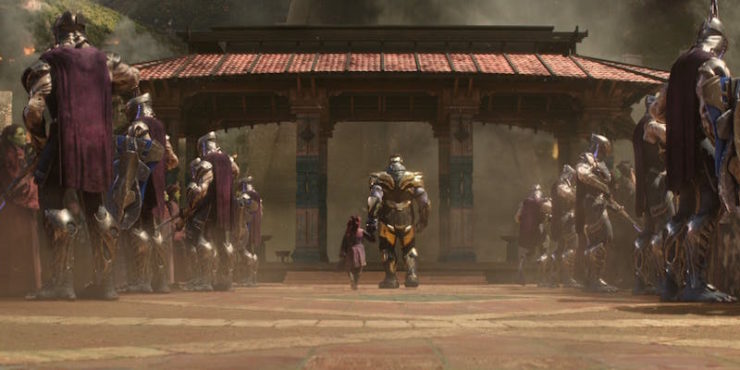
And then, sometimes it’s not complicated at all. Sometimes Bad Dads are just bad. Evil Dads plague the MCU and are by far its worst villains: Obadiah Stane, Alexander Pierce, and Ego the Living Planet. Evil Dads don’t care about the welfare of their children, and will exploit or even kill them to further their own goals. These men are sociopathic monsters, and the films have no sympathy for them. The Evil Dad is meant to be destroyed.
The ultimate example of Evil Dad is, of course, Thanos. He has a universally genocidal goal and literally sacrifices his daughter to achieve it. Furthermore, he’s the only Bad Dad who explicitly abuses his children, pitting his daughters in combat against each other in the past and physically torturing Nebula in order to mentally torture Gamora in the present.
Note that these categories are not mutually exclusive. One character can be many types of Dad, depending on circumstance. For example, for the first half of Iron Man, Stane comes across as “merely” a Crap Dad, keeping the darker sides of weapons manufacturing from Tony to protect his fragile self-esteem. Then we learn that Stane has been feeding off Tony’s brilliance for years and is now outright trying to kill him. Yondu goes from being an Evil Dad, threatening to eat Star-Lord, to Crap Dad to be outgrown and finally to Dead Dad to be honored. T’Chaka, on the other hand, goes from being a Dead Dad who has “never failed” his son to being a Crap Dad who totally and completely failed his son, his country, and the world. Good going, T’Chaka.
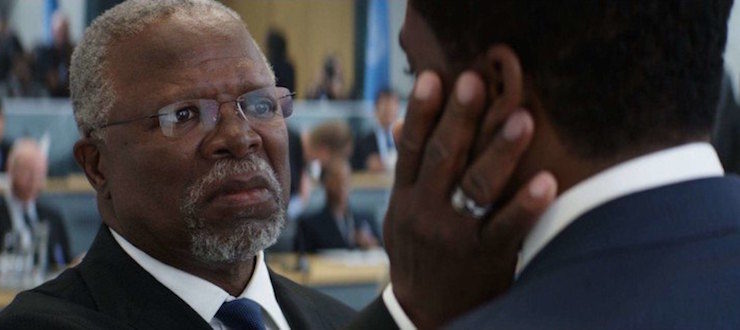
The theme of fatherhood, and its failures, hangs over the stories of actual fathers who are also heroes, including Clint Barton and Scott Lang. Drax’s shame over the death of his wife and daughter and his belief that he failed as a father drive all his choices, from his bullheaded pursuit of revenge against Ronan and Thanos, to trying to mentor Peter Quill and comforting a mourning Rocket.
Buy the Book
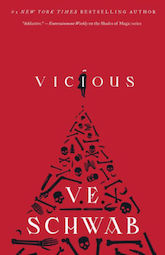

Vicious
It really colors Tony Stark’s arc, especially post-Avengers. Suddenly finding himself protector of the world, Tony struggles with how to be a Good Dad when he doesn’t have a great role model to rely on. So he keeps trying new things and failing. Iron Man 3: I’ll fix everything myself. Oops, that didn’t work. Age of Ultron: Okay, I’ll build a big machine to fix everything—oh, oh no, that went horribly. Civil War: Okay, let’s just write some rules about how we’re going to work together—oh c’mon, that should have worked.
This culminates in Spider-Man: Homecoming, where Tony finds someone who is basically his 15-year-old self: young, brilliant, burdened with power and responsibility, and suffering from a VERY similar loss. Tony wants to do right by Peter Parker, but he legitimately doesn’t know what that is, and thus finds himself being a Crap Dad. He vacillates between empowering Spider-Man, literally giving him the iconic suit, and discouraging the kid from putting himself in mortal danger. This controlling, manipulative behavior makes Tony very much a Crap Dad. Not Obadiah Stane bad, or even Odin bad, but still not a person who provides the support and guidance that Peter so desperately wants. It’s not until the end of the last movie, where Tony learns to listen to Peter and trust that Peter can make decisions for himself, that Tony becomes the elusive Good Dad.
And, yes, Tony becoming a Good Dad does make the end of Infinity War that much more heartbreaking.
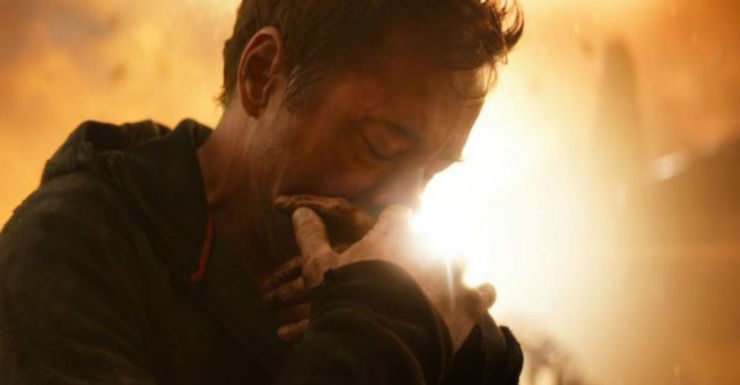
(Note: I’m talking about the Bad Dads of the MCU and not the Bad Moms, because there aren’t any. There aren’t many women in the MCU to begin with, even fewer mothers, and fewer still female villains. What mothers exist are either loving and supportive but kinda useless as moral guides, or… dead, and not in the Dead Dad sense. Dead Moms are not seen as role models to be replaced, but lost prizes that must be avenged. So far, there are THREE movies that have a version of the line, “You shouldn’t have killed my mom!” If they ever get around to making a Black Widow movie we might meet the Mistress of the Red Room, who is definitely One Bad Mother, but until then, Moms are mainly just sources of comfort.)
Seen as a generational struggle, the MCU is revolutionary in a very literal sense. These movies are about heroes replacing, outgrowing, and in some cases utterly destroying the men who are currently in charge. Evil Dad Alexander Pierce says, “to build a better world sometimes means tearing the old one down,” and that’s tautologically true, but he leaves out the fact that he is the old one. Pierce is the head of the most powerful intelligence agency in the world, and plans to murder millions in an attempt to further entrench his already massive power. To build a new and better world, Pierce is the one that needs to be torn down.
Superheroes often get knocked as defenders of the status quo, but at least in Avengers films, they have been anything but. They are constantly remaking their world: toppling kings, gods, demons, planets, a whole host of Bad Dads, and replacing them with themselves. For the better, they hope.
Steven Padnick is a freelance writer and editor. By day. You can find more of his writing and funny pictures at padnick.tumblr.com.






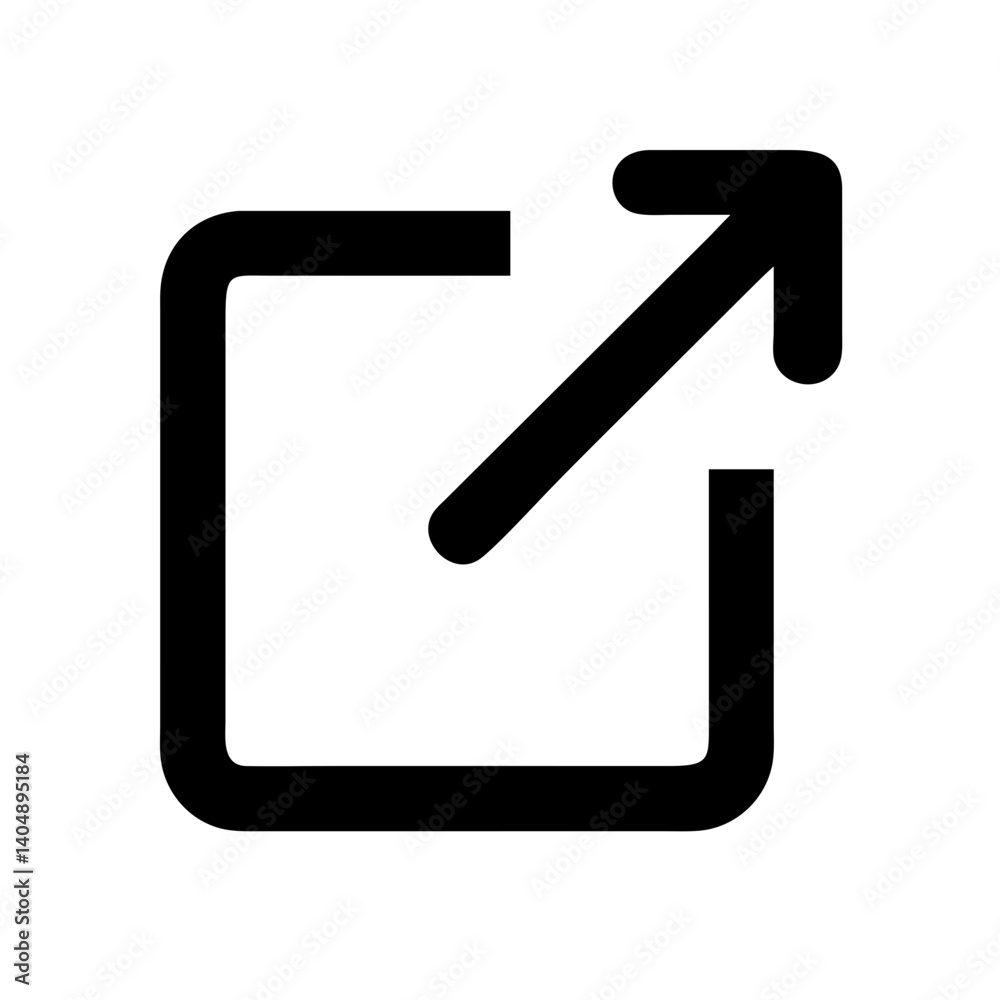




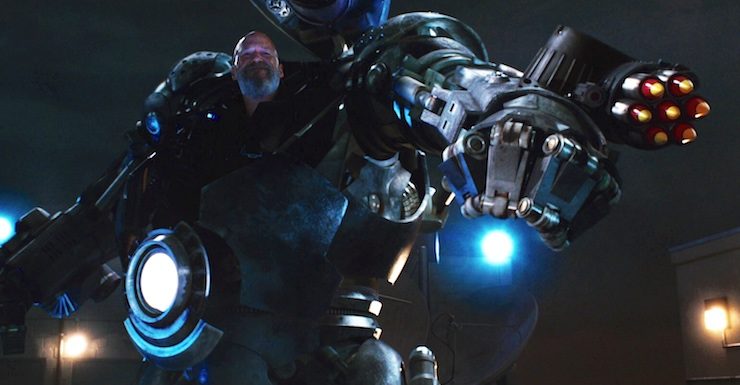
I can tell you exactly why this phenomenon exists: we are a generation of broken parents. Either our grandfather’s didn’t come home from war, or our parents divorced, and in the case of divorce, the overwhelming majority of us stayed with Mom. So Dad was either Dead or the closest thing to it, and often replaced by a step-Dad, and let’s face it, most step-Dads are either Crap or Evil. Comic books, and thus their film adaptations, are relatable escapism. We need to see ourselves in our heroes and heroines. It’s unfortunate that so many of us do.
I don’t exactly think that this phenomenon is either recent, or restricted to comic books. The entire Western canon is filled with Dead Dads and Crap Dads and Evil Dads.
Father/Son conflict is one of the most ancient tropes in storytelling. Mother/Daughter isn’t far behind. Interestingly the opposit sex parent is often depicted as supportive of the child. Mothers back sons against Daddy and Fathers help daughters defy Mommy.
BTW the third image interests me, is that Odin and Hela or who?
What about the Ancient One in Dr. Strange? She was basically a “crap mom” if not a “bad mom” under this analysis…
princessroxana @@@@@ 3 – I believe the picture you’re referring to is Thanos and Gamora.
Dad issues were baked into the Marvel cake right from the start of the Silver Age of the comics, although not as clearly tilted toward ‘bad dad’ issues as the current MCU incarnations.
Stan Lee and Jack Kirby were WWII vets, and some of their characters were also vets of that war, specifically Nick Fury, Reed Richards, Ben Grimm and Steve Rogers. Nick Fury wasn’t a father back in those days, but the head of SHIELD, in his original comic incarnation, was much less dark than his MCU counterpart, and would have fallen into the “tough but fair” dad. Reed Richards was clearly the good dad. Ben Grimm would have been the dad who refused to grow up. And Steve Rogers was a special case, as he was unstuck in time.
I don’t remember Tony’s dad being in the picture back in those days, but perhaps he was; I didn’t follow him as closely. Odin, though, was clearly a bad dad, mercurial and unpredictable. Daredevil’s dad loomed large in his life, as the failed boxer. And Spider-Man was marked with the loss and absence of a dad. Spider-Man had a very complex generational relationship with the dad of his first girlfriend Gwen.
It is interesting to contrast the generational issues of the comics versus the MCU.
But how will we know without a tedious angsty origin movie which is 90 mins of moodiness and ten minutes of the action and characters we paid for, with the threat that unless we sit through the padded first movie we won’t get a second?
Do you think we’ll ever get Batman movie like that?
@5 Thank you. Great Big Armored Dad and his little girl. Interesting image.
@7 it’s a fair assumption. I’m not really into comics but even I know about Peter Parker’s Uncle Ben and how he died.
As Amaryllis said, father issues are very much a part of the English/American literary canon. Americans, in particular, were obsessed with the issue with many classics about a son finding his father and finding himself. In HUCK FINN, for example, early on Huck finds his biological father Pap dead. Pap was an abusive and racist drunk. Huck then goes on to find a spirtual father in Jim who is exactly opposite, and Huck recreates himself closer to that truth.
A good number of the first comic book writers and artists were Jewish and the 20th century was at the very least a turbulent century for the Jews. Whole families were destroyed in the Holocaust and of course that means that the whole father-son dynamic was changed. Many survivors grew up without fathers and mothers. More than that many of those same comic book writers and artists were also from an immigrant community, and the difference between the (Eastern) European Jewish upbringing and the father and son dynamic versus the father-son dynamic in the United States was very different. Children in the United States tended to be more independent and thew off the religion and culture of their “old world” fathers. So this too was likely a factor. Since the movies are a reflection of the comics’ plot-lines it isn’t surprising that these issues filter down. And it isn’t just the MCU. What about DC’s Batman and Superman (arguably their two leading characters) who both grew up without their biological fathers and were raised by other men. (That even repeats in the next generation with the case of Robin who is Bruce Wayne’s “ward”).
The constant daddy issues (or idolization) are one of the things I can stand less in media, especially American media. I can understand them when the main character is a teenager or still living with their parents, but one would suppose that people would get over all that at some point in their adulthood, especially when they have a lot more going on in their lives. I care for my dad a lot, but if we only talked once every year or so for the holidays I would be just fine. He’s neither my hero nor my antihero, and he definitely isn’t a huge part of how I define myself these days.
The constant daddy issues (or idolization) are one of the things I can stand less in media, especially American media.
Definitely. I feel like grabbing every American author and screenwriter by the scruff of the neck and screaming “DUDE! THERE ARE OTHER POSSIBLE CHARACTER MOTIVATIONS!” Don’t you guys ever write stories about adults?
@13/ajay: “Don’t you guys ever write stories about adults?”
Oh yes. This reminds me of the day when I asked my husband: “Can we stop watching American detective shows and watch German detective shows instead? At least in a German detective show, there’s never an episode where we learn that the lead character, a grown man, has always had problems with his father.” He was silent for a moment, and then he said: “You’re right – it really happens every time.”
For those posting the father issue is American…have you never read literature ,from any culture? Read Japanese, Greek, Indian , Middle Eastern , European stories,religions and mythology and it is all about family issues. The Abrahamic religions, that is, those who trace themselves to being descended from the father Abraham are Christianity, Judaism and Islam. Those religions all have father/ family issues as core issues and those religions and ideas include peoples across the globe.
The problem with this analysis is that it’s very cursory to the point of superficiality, even with some of the specific references made (for example, Pierce is described as an ‘Evil Dad’ and Dr. Erskine is described as a ‘Dead Dad’); additionally, the author erroneously claims Tony Stark’s relationship with Howard is a significant (‘so much’ to quote the author) facet of the ‘Captain America films in spite of the fact that Howard is only mentioned in passing in the second film of that trilogy and, in spite, of the fact that the third film isn’t a true stand-alone sequel by most definitions of the word, Howard is not mentioned at all in that film. In the initial Captain America film, Howard Stark has a substantive enough role as a scientist, pilot, inventor and colleague of Captain Rogers. Tony isn’t even a gleam in this character’s eye as Howard is not even married, much less thinking about that or fatherhood. His relationship with Steve is clearly that of a researcher and subject initially (they are not even actually introduced nor shown as meeting prior to the super soldier serum infusion experiment) and when Howard and Steve meet again (in Germany, and then in London), they are very clearly colleagues with absolutely nothing that can be described as the type of issues raised in the Dead Dad sections of this piece.
The author’s additional reference to Steve is of his being in ‘literal block of ice’ in a reference to bad dads keeping Stark and Thor in a state of arrested development. While it could be intelligently argued that Steve was in a state of arrested development, claiming it’s due to a bad dad (even the tangential suggestion, not made herein, that the Red Skull was Steve’s Bad Dad here wouldn’t actually apply, not to mention be highly laughable). The other reference is that dead dads going missing create a situation where their absence, their lack of ability to provide guidance, etc., harms the main character. While Erskine is and can be read as a mentor, Steve was raised by his Mother since both the MCU and the comics canon confirm that she raised him as essentially a single mother due to his death in WWI. Rather than give credit and credence to his upbringing by Sarah Rogers, author is suggesting that Steve needs to ‘[learn] and [relearn] that what they were taught as kids is not how the world actually works’ – this is absurd given the fact that Steve’s morality and world view are clearly on view in the second and third film and where there is a variance, its far more likely explained by the dissonances of the changes, not simply culturally, but technologically and otherwise, from the early 40s to the current century. To suggest that a scientist Steve knew for a few weeks in basic training somehow altered or significantly impacted Steve’s moral code, sense of self or inherent characteristics more than Sarah Rogers is, once again, simplistic and unrealistic.
It’s true that some of the aspects described clearly apply to some major players in the MCU. To say it’s the driver is absurd. To suggest it impacts that major films is nonsensical.
Do better, Tor. Or call these opinion pieces, and not suggest that they are analysis or critical thinking.
To all… I write this not to create issues or angry or anything, just as information purpuses and maybe to get you guys thinking about the overall place of your society: Please, pleaaaase stop refering to the USA as America, America is big and has a loooot of countries in it, not just the US (I’m from Spain, and have lived in the US btw). Food for thought.
I appreciate this post bringing up facets of the MCU I had not really noticed before.
Atrus @12- When you cannot ever again converse with your dad, you will understand. Hopefully not for a long time.
Angel @17- a LOT of the rest of the world refers to the USA as America, and the citizens thereof as Americans. DO you have a suggestion for what those people should be called? (no, not United Statesmen!)
Most are aware of the issue, but an improved alternative has not yet been suggested.
@18: USians works. (A little tricky to pronounce, but much clearer in print than “Americans”.)
Slightly irrelevant comment–I notice that no women or girls lived in Oakland during BLACK PANTHER. One can only hope that Shuri can smoke them out somehow.
Hmmm. First post I tried to make didn’t appear, odd.
I can’t really blame the Ancient One for the way she acted, and do not think she belongs in the “Crap Dad” category. I’m reasonably certain that anyone who didn’t spend their childhood reading fantasy books and wishing that magic was real would turn and run if they were told “magic is real, I’m the Sorcerer Supreme who guards the Earth from being destroyed, you were born to be my successor, I’m going to die soon, you’re going to have to deal with evil entities trying to possess you once a week for the forseeable future and you’re going to be miserable because doing the right thing is almost never going to be doing the thing that lets you sleep at night”. Even leaving out the part where he was fated to kill the Ancient One because they decided to kill her in the Dormammu story arc, that… is a lot for someone who isn’t already fascinated by magic to absorb.
There is such a thing as withholding information out of kindness, or an awareness that the person you’re telling is not capable of reacting well to the news. I’m picturing my incredibly grounded in reality, only reads history and science books, “why do you waste your time on fiction?” father being told the absolute truth of what the Ancient One withheld from Strange, and it is hilarious.
Please, pleaaaase stop refering to the USA as America, America is big and has a loooot of countries in it
Angel: no. Please stop telling us how to speak our native language; we know how to speak it.
In English, “America” is a generally used short form of “The United States of America”, and the adjective is “American”. Virtually no uses of “America/American” in English include countries other than the USA. If you say something like “Toronto is the nicest American city by far” or “I had a great holiday in America last year, we went to Yucatan” or “Justin Trudeau is one of the most intelligent people in American politics”, English-speaking people will think you’re an idiot. If you say something like “this product is 100% American made” and it turns out that it comes from Brazil, you will be convicted of fraud.
If we want to talk about the continent that contains the USA, Canada and Mexico, we say “North America”. If we want to talk about the whole supercontinent from Alaska right down to the Drake Passage, we say “The Americas”.
That may not be the way you would like it to be, but it’s the way English is spoken.
@15/Alan: That isn’t the same, though. If you watch a contemporary US-American TV show or a US-American film series, you can be almost certain that in the second season or the second film, you’ll learn that the hero, a grown man in his thirties or forties, has always had problems with his father. Always men, always fathers. And that’s just ludicrous. Those people should have resolved their difficulties years or decades ago.
23: agreed. Yes, mythologies all round the world have stories about families – of course they do. Stories about humans have to involve human drives and desires, and a lot of our strongest drives are to do with families.
But they don’t have to involve grown men with problems with their fathers. Odysseus didn’t have daddy issues. Nor did Achilles or Gilgamesh or Solomon or Horatius Cocles or Theseus. Nor, if you go a bit later on, do Sherlock Holmes or d’Artagnan or Davey Balfour or Don Quixote.
Alan@15: even if that were true, and there’s plenty of stories that don’t fit that mold, family issues is different from father issues, both in thematic content and tropes. You’d be hard pressed to find the heart-of-gold detective in a cop show quoting his mother from wisdom, or saying that he always played softball after service with his aunt, or that his older stepsister was the one who taught him the value of life. In that sort of story it’s almost inevitably the father. It’s why shows like Supergirl stand out in how they treat those dynamics, despite the cheesiness. It’s why self-aware comedies tend to make fun of the man-child looking for a substitute father-figure. Because it’s a story that’s already been told to death. Let’s mix it up a little!
sps49@18 : I would definitely miss him, but I still wouldn’t go on saying that he was my hero, my best friend, the man who made me who I am today, or any of those platitudes you hear when a character puts their father on a pedestal (Almost never the mothers, though. How odd… /s) because he is not any of those things. And anyway, as the article says, a good deal of the daddy issues in media are about living fathers.
Or on the opposite trope, I have friends who have had an abusive or distant father who is now out of their lives, and so I find it extremely cringeworthy when characters in media go “But you have to give your father another chance, he’s family“. Hell no. Some people don’t deserve an extra chance, no matter the blood or family ties. Even the stories where the character tries to rebuild bridges and it goes wrong make me feel queasy, because said character was almost always bullied by their peers into trying again despite their painful past.
You do see that happening, but it is always from the black detective. Thinking back; I struggle to remember when black characters reference their male relatives, it seems to always be their “grammy” or their “aunty”. But then that is a very different set of tropes and prejudices with nasty implications.
@24: Odysseus may not have had father issues, but Telemachus certainly did.
People always forget, with all that voyaging around to exotic islands, that a fair amount of the poem focuses on Telemachus and his issues with his missing father, and his father-substitute Nestor, and his would-be stepfathers the Suitors.
And while Achilles may not have had father issues, consider Priam and Paris– that must have been a fraught relationship! You could even say that Paris wouldn’t have been herding cattle on that hillside, and available to take a side among squabbling goddesses, if Priam hadn’t abandoned him. And where’s your epic then?
Odysseus may not have had father issues, but Telemachus certainly did.
Yes, and that’s fine, because Telemachus was only an adolescent. He was a baby when Odysseus left for Troy (the “ploughing the sand” incident). And the Odyssey is Odysseus’ story, anyway, not Telemachus’.
You’d be hard pressed to find the heart-of-gold detective in a cop show quoting his mother from wisdom
There’s a bit in Dorothy Sayers’ “Gaudy Night” where Harriet finds herself thinking on similar lines; it’s always said that a great man has a great woman standing behind him, she thinks; how many great women have had a great husband or father behind them? Elizabeth I? Hardly. Victoria? The Brontes?
I think Wonder Woman counts as a great woman with a great woman behind her. Yet even she has to deal with daddy issues — Ares is sort of a daddy, right? In Greek myth Ares was the father of Hippolyta; I think it may have gotten changed to Zeus somewhere in Marvel comics / MCU, but still.
@24 @27 How do you talk about the ancient Greeks and daddy issues (and certainly mommy issues too) and fail to mention Oedipus?
Quote “Iron Man 3: I’ll fix everything myself. Oops, that didn’t work. Age of Ultron: Okay, I’ll build a big machine to fix everything—oh, oh no, that went horribly. Civil War: Okay, let’s just write some rules about how we’re going to work together—oh c’mon, that should have worked.”
That was a great analysis. Great! And I might add that even though I agree with several points posted by some concerning your article, that it is in general a good one, and I can’t understand those outcries to TOR by a post above concerning your piece.
I enjoyed this article, but as a mom myself, I can’t help but think, “Aren’t we all Crap Dads/Moms?”. I don’t mean that to sound insulting, it’s just that eventually, my kids will have to come to terms with the realization that I’m not perfect, I can’t protect them from everything, I might even (inadvertantly) hurt them at some point, or make a decision that at the time I thought was the best one but turned out not to be. Just like I had to eventually realize. I think you’ve hit on a really good point here, but I also think part of the reason it’s so resonant is because it’s such a core trope in fiction. I chuckled a bit at some of the summations of American (sorry not sorry ;) ) drama – you’re right, there do seem to be a lot of daddy issues. I’m from a family with pretty strong ties – but I don’t have a troubled relationship with them, either. I’m pretty indepdent, but I CAN safely say they are a huge part of what made me what I am. But I have known many friends who didn’t have that same kind of closeness and it CAN be a hard thing to move past, especially when going through some kind of major life change. I’m not surprised that it’s mined in drama although I can agree a little diversity would be nice (and I agree completely that abusive relatives don’t get a pass because ‘they’re family’. Eff that noise.)
But I do hear you on the whole difference between how the father vs. mother relationship is portrayed (although Ancient One should certainly be in the Crap Mom category if you’re going to count her – not that I think she was that ‘crappy’, personally).